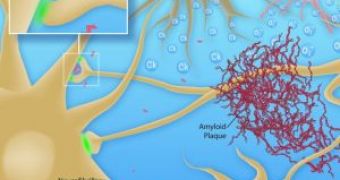The neurodegenerative condition which affects a large number of people, mainly older ones, was known to be triggered by certain key-factors, but new studies show that there may be another cause which has not been taken into account by scientists until now: low levels of brain oxygen. More exactly, an investigation carried out recently by a team of experts at the Canada's University of British Columbia brought to light the fact that low levels of oxygen carried to the brain by the blood flow may play a crucial role in Alzheimer's disease.
Lack of appropriate amounts of oxygenated blood into the brain was shown to boost plaque formation on cranial cells, which further leads to the decline of the cognitive function, the main symptom of the fearful neurodegenerative condition. A decrease in the normal levels of oxygen carried to the brain in the blood stream is usually triggered by brain blood vessels narrowed and hardened by high levels of 'bad' cholesterol which build up on the interior walls of the vessels etc.
When the brain blood flow is restricted, so is the amount of brain oxygen. If one's brain receives lower than normal levels of oxygen, then plaque formation on neurons is enhanced and the cognitive decline grows more quickly. Canadian researchers also explained that lower levels of brain oxygen turn on a certain gene called BACE 1, which is associated with elevated levels of the beta-amyloid protein. Beta-amyloid protein forms the plaque on brain cells which further impedes the communication between neurons and brings about cognitive decline.
Lead researcher of the study Weihong Song, Professor of Psychiatry who holds a Canada Research Chair in Alzheimer's Disease at the University of British Columbia in Vancouver pointed out: "If you have less oxygen, you turn up this gene and obviously generate more beta-amyloid protein. If you have a higher level of beta-amyloid, you form more plaque. If you have this plaque, then you will have dementia."
The study was conducted so far on mice that have been kept in cages with low-oxygen air for 16 hours out of the 24 hours of a day for one month period of time. After the end of the study, mice in the low-oxygen air group and mice in a control group had to face a memory test. The memory test consisted in swimming as quickly as possible through a water maize to reach a hidden platform. The rodents have been timed by the researching team and overall results showed that those in the low-oxygen air group performed significantly worse than their peers in the control, normal-oxygen group. Brain tests also showed that low-oxygen mice presented increased levels of brain beta-amyloid plaque.
The conclusion of the report published in the Proceedings of the National Academy of Sciences Journal was that people should try preventing low levels of brain oxygen by adopting an overall healthy diet and lifestyle, as a wide range of health disorders and conditions are known to trigger hypoaxia. For instance, earlier studies have shown that a stroke causes a 3-fold decrease in the amount of oxygenated blood which reaches the brain. Cardiovascular disease is also known to play an important role in the reduction of oxygen amount carried to the brain.
Dr. Ralph A Nixon, Professor of Psychiatry and Cell Biology at New York University and a spokesman for the Alzheimer's Association commented: "The study reinforces another message that has emerged in recent years -- that the health of the cardiovascular system is very important for the health of the brain. The things one does to promote the health of the cardiovascular system are going to help the brain when it is challenged in Alzheimer's disease. Lifestyle factors such as diet and exercise are also an edge against hypoxia.
If we can improve blood flow to the brain, maybe we can help slow Alzheimer's progression. This report provides the mechanics for that. Increasing blood flow for the heart also helps slow Alzheimer's disease," concluded the scientist.

 14 DAY TRIAL //
14 DAY TRIAL //